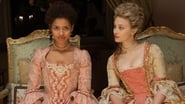Michael Ledo
Belle is a hard movie not to love. It is a historical romance as well as a film about social justice. Through circumstances, Belle (Gugu Mbatha-Raw), a "mulatto" whose father was of some means, is raised at the manor of her great uncle Lord Mansfield (Tom Wilkinson). Lord Mansfield has raised his grand niece in a proper fashion, but is aware of "the nature of order" and keeps her away from company at former dining. She is raised as a sister with her cousin Elizabeth (Sarah Gadon), whose father has less means. Belle acquires an inheritance and suitors while Elizabeth's financial status puts her at risk of being able to marry into her rank. Elizabeth points out to Belle, that all women are property.Belle develops a mutual attraction for John Davinier (Sam Reid) a man beneath her in status, the lowly son of a vicar. He aspires to be an attorney. He is currently at odds with Lord Mansfield, the Chief Justice of the country. A court case concerning the sailing vessel "Zong" threw its cargo of slaves overboard claiming lack of supplies. The insurance company claims fraud and does not want to pay. The decision rests with Lord Mansfield, a traditionalist.The film was well done. It will be hard for the Academy to ignore this one, especially in an off year of films. I couldn't help but be drawn to that moment in "Lincoln" when they repealed slavery, the decision of Brown vs. the Board of Education, or even the passage of the Civil Rights Bill. Also a good performance by Emily Watson as Lady Mansfield and Tom Felton returns as a screen bad guy.
l_rawjalaurence
I wish something more positive could be said about Amma Asante's film. It is so eager to please with its sumptuous sets and costumes, its use of historic locations (including London's Kenwood House), and its precise attention to historic detail.Yet there is a fatal flaw at its heart. The reason is that the director does not seem to know whether they are making a love-story, a piece of social commentary with direct significance to today, or a heritage film, or all of them. Dido (Gugu Mbatha-Raw) is a mixed race girl living in a bourgeois household under the protection of Lord Mansfield (Tom Wilkinson). Although theoretically free, she is denied most of the privileged due to her white relatives and remains the butt of casual racism from a variety of sources, including Lady Ashford (Miranda Richardson), and her son James (Tom Felton). She finds a sympathetic ear in John Davinter (Sam Reid) who after a series of debates with Lord Mansfield, eventually wins him over and they live happily ever after.Yet that love plot is complicated by the politics, centering over a legal case trying to determine whether some ship-owners were directly responsible for the death of a group of slaves. This is a true story, the outcome of which precipitated significant reform in the anti-slavery laws at the end of the eighteenth century. For contemporary viewers the topic has particular significance as it evokes similar sufferings experienced by contemporary refugees as they desperately board boats in an effort to escape their war-torn states, only to find themselves exploited by unscrupulous profiteers.Yet DIDO perpetually shirks this issue in favor of visual clichés - the lengthy walk by costumed characters, the pretty-pretty sites of green landscapes lovingly photographed at sunset, the clip-clop of horses' hooves along immaculately soiled cobblestones. It is as if director Asante were deliberately trying to placate a readymade audience. In truth several of these sequences are boring, holding up what might have been a complex plot and thereby diverting our attention.
Matt Roberts
Amma Asante's movie is based on a true story which revolves around a painting from 1779 and events leading to what many saw as the beginning of the abolishment of the slave trade in England.Dido Elizabeth Belle (Mbatha-Raw) is the mixed race illegitimate daughter of a navy admiral who is brought over to England and raised by her great uncle the Earl of Mansfield (Wilkinson) the Lord Chief Justice. Her life within the immediate family is happy and settled and she becomes very close to other niece being looked after Elizabeth Murray (Gadon), but underlying racism and ignorance of the time exclude Belle from a certain social gatherings, leaving her to eat with the servants.When Belle inherits a fortune the dynamic between her and Elizabeth does change as all of sudden suiters for her hand now start to appear with her new found wealth. Belle however falls for John Davinier (Reid) son of a local clergyman, wanting to better himself in life and train as a lawyer under Lord Mansfield. His outspoken views on a case the Lord is ruling on which involves the slave trade.The period costume and setting are visually stunning but it is the performances that really catch the eye. Mbatha-Raw is a revelation, in every scene, bewilderment of living in such privilege but having to endure such prejudice. One scene in front of a mirror where she almost wants to tear her skin off carries such power in the simplicity of its execution. The support is excellent, Wilkinson gets better with time and while he carries all the authority, power and standing of an Earl of the time, he still shows vulnerability as a parent figure and also subtle humour in the role. Reid will also win many admirers for his turn as Davinier not just wide-eyed and idealistic he oozes underdog charm.This isn't just a film about racism, albeit taking part in a time where nowadays we really can not understand how deep rooted the ignorance of skin colour was. It also takes a close look at class and sexism, two forms of prejudice that still exist more greatly in the modern world and need just as much attention.
kcla
This is a fine film based on an amazing true story. It is hampered by a pallid lead performance and an over-emphasis on the (mostly fictional) romance between Belle and John Davenier.There is a standout performance by Sarah Gadon, as Dido's sister- cousin. Tom Felton, James Norton, and Miranda Richardson also provide much needed spark.Little is known about Dido Belle, most of our impressions is based on the famous painting. However, the film's characterization fails to convey the charm and playfulness of the woman in the portrait. Instead, the lead actress is left to make 'serious' faces with furrowed brows, watery eyes, and heavy corset-breathing.Oddly, it is the romantic lead which is the catalyst. John Davenier opens Dido's eyes to the iniquities of the slave trade and her status, which is historically inaccurate and a disservice to the real- life individuals. The film seems more concerned with the romantic life of the heroine than exploring the relationship between her and her family. Dido was an unusual woman, but so was her family. It was her relationship with her uncle and his historic decisions which abolished slavery in Britain that makes her story relevant. The writer does a good job though, of portraying all the inequalities of Britain. Dido may be hindered by her race, but her cousin and others are no less hindered by their poverty and gender. And the film does a good job of exploring the complexities and difficulties of Dido's relationship with society.




